N.B. La version française de ce billet se trouve ici.
When a single child is killed in our so-called civilized countries, there is general feeling of distress and it is reassuring that this is the case. People often take to the streets to express their indignation, even if they do not know the child killed.
Israel has already killed 12,000 children and destroyed the homes of 600,000 others. However, the majority of people in our so-called civilized countries are not informed or look the other way. Ghassam Salamé wonders: Is there a fatigue of international compassion? Fortunately, there are some exceptions, like here.
There is an odious and staggering disproportion between
- the attention our mainstream media are willing to give to the murder of a single child in our own countries, as opposed to
- the little interest given to the more than 12,000 children massacred in Gaza, killed by a people gone mad.
In an attempt to reflect the extent of the massacre (a record of murders in a very short time), Australian activists wrote onto a large paper banner approximately half of the names of the children who were killed. This banner spans several meters.
Nevertheless, the atrocity of the crimes becomes even more horrific when one realizes that these crimes are part of a genocide.
An "EDUCIDE" is a component of a genocide. In the case of Gaza, it is the massacre of children, students, teachers, and also the destruction of educational infrastructure, namely schools and universities. An "EDUCIDE" is even the component that most clearly denotes the will and intention of genocide, as attempting to destroy a people's culture and their means of transmitting learned behaviors is indeed an attempt to annihilate the long-term existence of that people.
A month ago, Dieudonné Leclercq, Professor Emeritus at the University of Liège, who was my mentor when I was a researcher, forwarded me an internal message from this university, authored by none other than the Rector of the university herself. I just found this message published on the website of the Association of Academics for Respect of International Law in Palestine [AURDIP]. This committed message well sums up the destruction of the education system in question.
Below is the translation of this message originally written in French.
March 13, 2024, Message from Anne-Sophie Nyssen, Rector of ULiège,
Unjustifiable war against education in Gaza.
As Rector of ULiège, and following my post on November 2, 2023, in which I called for an end to violence as well as access to vital resources, healthcare, and humanitarian aid, I want to draw attention to the destruction of the Palestinian education system. In four months, hundreds of academics and teachers have been killed, including at least 95 professors and 3 university presidents. The Israeli army has destroyed the main libraries in Gaza, as well as numerous bookstores, publishing houses, and hundreds of other knowledge institutions. The twelve universities have been devastated. According to the UN, by early January, approximately 75% of Gaza's educational infrastructure had been damaged. Around 88,000 students have had to interrupt their studies.
Given the extent of these systematic destructions of educational infrastructure, it is no longer possible to believe that they are a regrettable collateral effect of the war against Hamas. It is clearly a targeted and intentional action, aimed at the eradication of one of the essential conditions for the survival of Gazan society itself: the availability of an educational structure.
If tremendous progress had been made in enabling access to education for everyone around the world, in recent years, we can only observe that the confiscation of the right to education is being used in armed conflicts and by certain regimes to control or even destroy populations. This is the case in Gaza, but also in Ukraine, Afghanistan, and in many other parts of the world.
I clearly and explicitly condemn the deliberate destruction of educational institutions and the ongoing discrimination against students and colleagues, which constitute a violation of the right to education, a fundamental right guaranteed by international conventions on the Rights of the Child and Human Rights. In this context, ULiège reiterates its commitment to suspend institutional collaborations with organizations, regardless of their origin, that repeatedly support or are directly involved in violations of international law and human rights.
I've highlighted in bold the end of this message, which demonstrates the responsible commitment of a university that does not stand idly by. Doing nothing is tantamount to being complicit.
The publication on the AURDIP website is another indication of this university's official commitment against the anti-educational barbarity demonstrated by Israel in Palestine. This site contains numerous testimonies and articles documenting this barbarity.
In my opinion, it is appropriate to call a spade a spade, in this case, to use the term "EDUCIDE" to underline what the Rector refers to as "a targeted and intentional action, aimed at the eradication of one of the essential conditions for the survival of Gazan society itself: the availability of an educational structure."
This is not about debating the use of a word, but rather about offering impactful communication summed up in a single word. It's a matter of media efficiency, knowing that there is already a very broad international consensus to denounce the "genocide" in Gaza, which goes beyond the horror of a mere "war" between soldiers. This broad consensus has been officially expressed by several countries before the International Court of Justice (ICJ) to the extent that this Court could not ignore the genocide. In its judgment of January 26, 2024, this Court warned Israel of the risk of genocide. One of the latest developments in this case is Nicaragua's complaint accusing Germany of facilitating genocide. This case was documented by Nicaragua for almost 7 hours before the ICJ. It is true that international law authorizes neither genocide nor complicity in genocide.
The word "EDUCIDE" may not be (yet) academically acceptable de jure, but it de facto allows to make a strong impression to facilitate the spread of ideas, make indignation contagious, and amplify exemplary acts of resistance, such as those of Madame Nyssen in her role as University Rector.
Here are some articles found on the internet by searching for the word “educide” in English or “éducide” with an accent in French.
- 30 January 2024, AURDIP, Le monde universitaire à Gaza a été détruit par l’« éducide » israélien.
- 02 February 2024, MDE, « Éducide » : les militants dénoncent la destruction par Israël du monde universitaire palestinien à Gaza.
- 31 January 2024, MDE, War on Gaza: Killing of Gaza’s academics amounts to ‘educide,’ say campaigners.
According to the latter article, the word "EDUCIDE" is said to have been proposed by Neve Gordon, Professor of International Law and Human Rights at Queen Mary University in London, to describe the destruction of Gaza's educational system.
On the same topic, another article can be found on the AURDIP website dated January 25, 2024, titled How Israel destroyed schools and universities in Gaza.
The same catastrophic assessment of the situation in Gaza is also described in an article published on March 6 in LeMonde, titled The twelve universities of Gaza destroyed or damaged by the Israeli army: « It's a war against education.» All higher education institutions in the Palestinian enclave were targeted by Israeli forces. Three presidents and nearly a hundred deans and professors were killed in the bombings.
It is important to highlight the deadly indoctrination experienced by the youth in Israel, as testified by an Israeli professor who was imprisoned, tortured, and harassed for opposing the war in Gaza.
Education in Israel is pitiful, as it is the product of a disturbed State, as explained by an Islam specialist who asserts that if Israel were a person, it would be interned in a psychiatric hospital.
So why a minute of silence?
- Firstly, because it is necessary for the educational community to mobilize.
Already on January 16, 2024, the collective L’Éducation avec Gaza launched a call for mobilization (translated from French):
MDE, Stop the massacre of Palestinians and the destruction of the educational system in Gaza!
We, teachers and education personnel gathered within the collective “Education with Gaza”, call on the educational community in France to raise awareness about the atrocities committed by Israel in Palestine and demand an immediate ceasefire .
Very well ! But how to mobilize?
The minute of silence is a simple way, a concrete action, to mobilize and raise awareness. - Secondly, because it signifies a deep solidarity with the Palestinian victims.
- Third, because it signifies a profound indignation regarding the genocidal policy systematically deployed by Israel in Gaza.
- Fourth, to alert the rest of the world to avoid complicity in genocide, and in particular, complicity in educide through ignorance.
In short, a minute of silence to denounce an educide is a means of placing humanity and education back at the forefront of the global community.
Addressing scientists, the working hypothesis could be formulated as follows:
the minute of silence for educide is not only a symbolic action but also educational and potentially therapeutic.
*This takes into account a feedback provided by Professor Dieudonné Leclercq regarding the original version of this post.
On an educational level, one might envision that, in a university lecture hall or a simple classroom, a minute of silence would be a sufficiently rare or unique event to leave a lasting impression and convey a dual moral lesson: a lesson of solidarity with the surviving victims of educide in Palestine and a lesson of indignation towards the perpetrators of educide in Israel.
On a therapeutic level, a minute of silence during classes could be an event that could gain momentum, especially if leaders in higher education encourage teachers to organize this minute of silence. If news of a minute of silence could spread to the point of being known by both victims and aggressors, the following effects can be anticipated:
- For the victims, the minute of silence for educide could offer them some moral comfort and encourage their resilience.
- For the aggressors, the minute of silence for educide could prompt them to become aware of the madness that drives them, to decide to end the crimes that have become their raison d'être, and to now work towards rebuilding in service of the surviving victims of their actions.
Moreover, in terms of ethics, if thousands of students pay tribute to thousands of victims, we can reasonably hope that a certain balance of dignity will be restored, making other educides significantly less likely.
Stronger than words to contemplate during the minute of silence, here are the images from a video by Al Jazeera contrasting the destruction of a university with the beauty of that university before the destruction, and the testimonies of students deprived of their university.
Gaza University destroyed: Israel accused of targeting education centers.

Agrandissement : Illustration 1
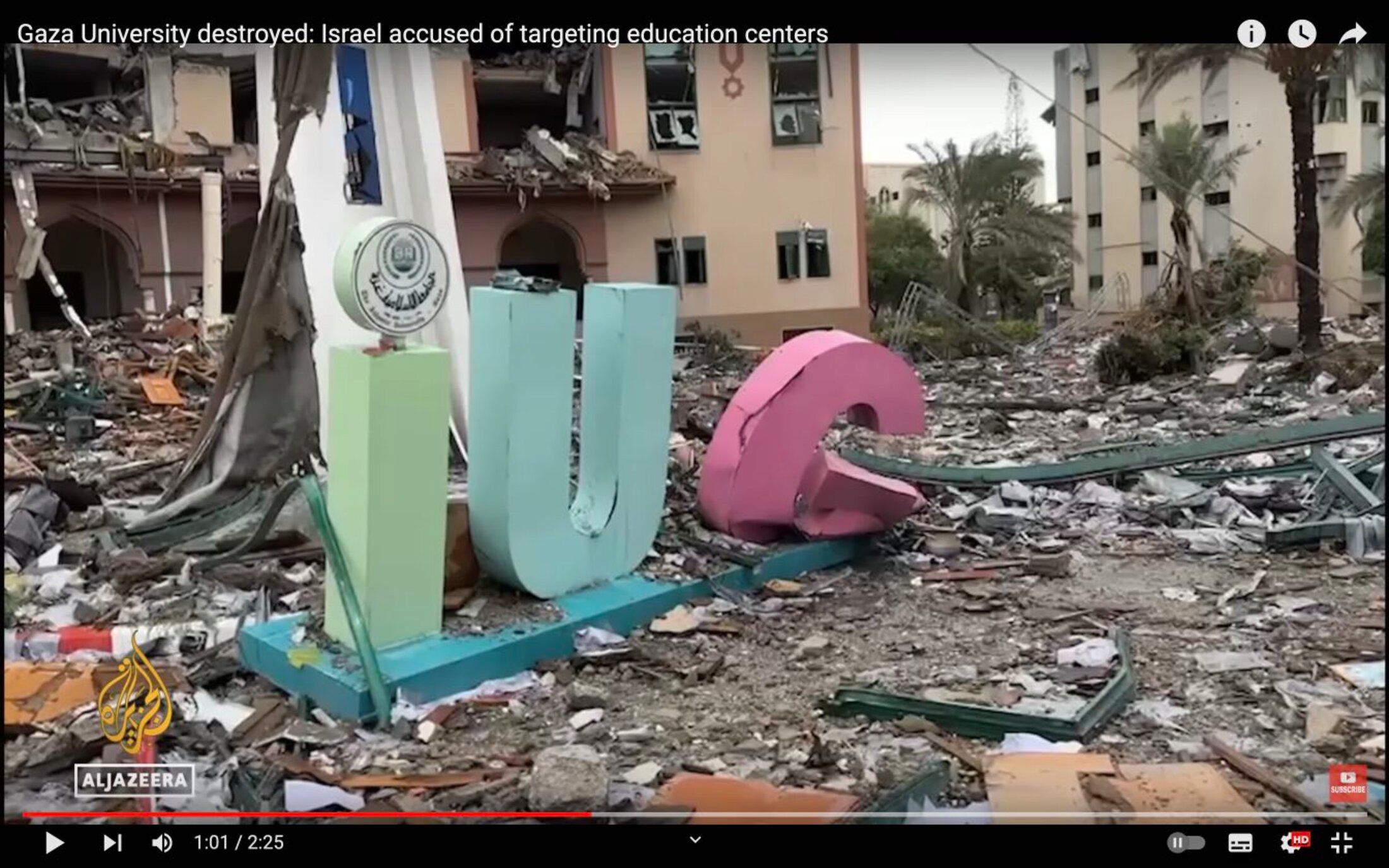
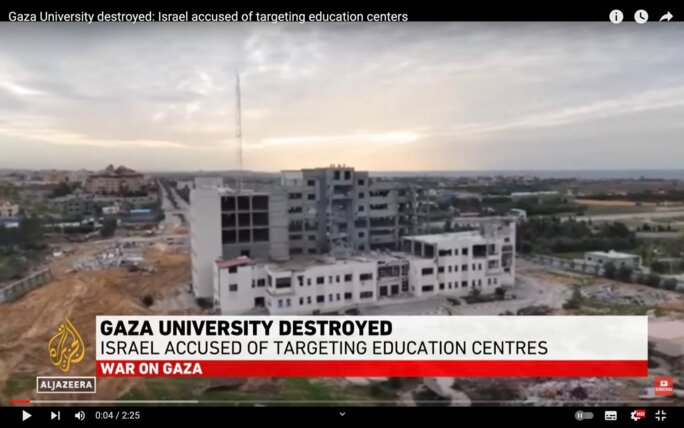
Agrandissement : Illustration 2


Agrandissement : Illustration 3


Agrandissement : Illustration 4

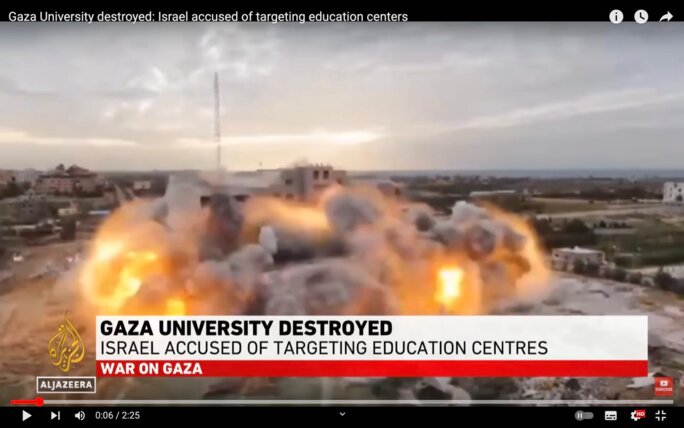
Agrandissement : Illustration 5


Agrandissement : Illustration 6
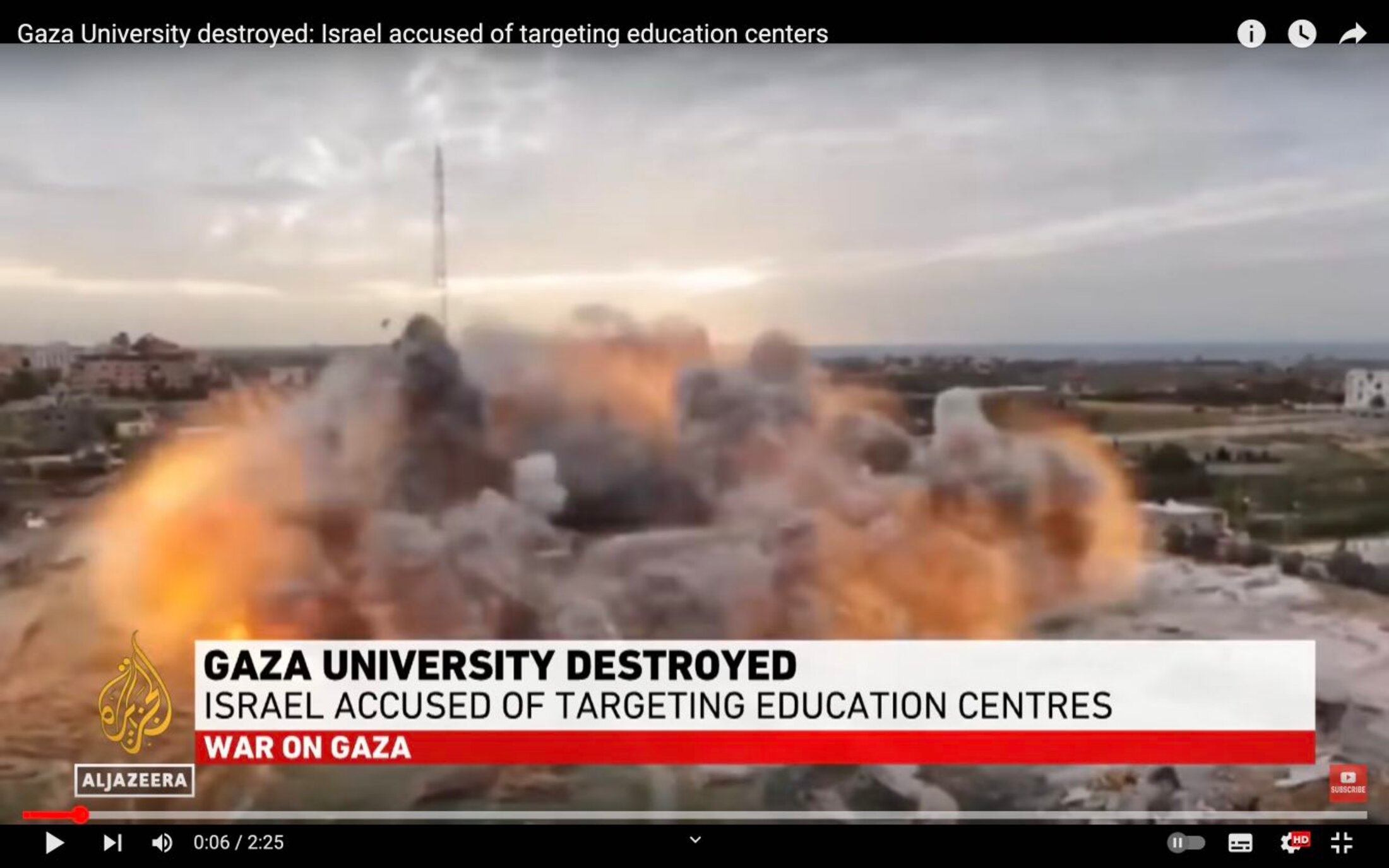
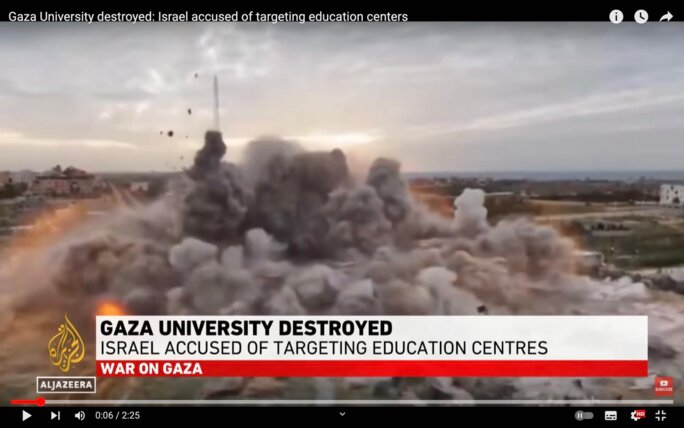
Agrandissement : Illustration 7


Agrandissement : Illustration 8

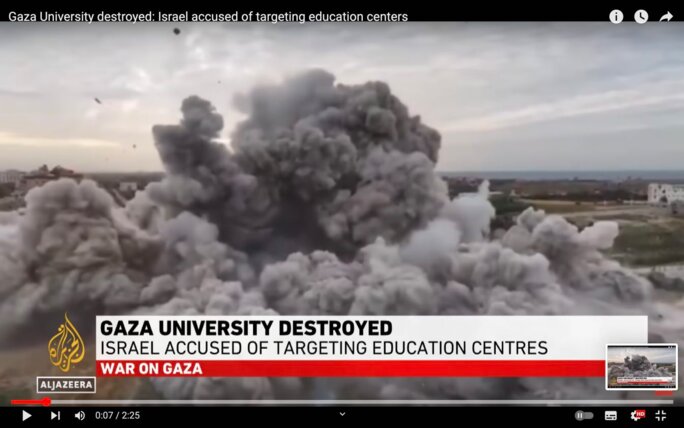
Agrandissement : Illustration 9

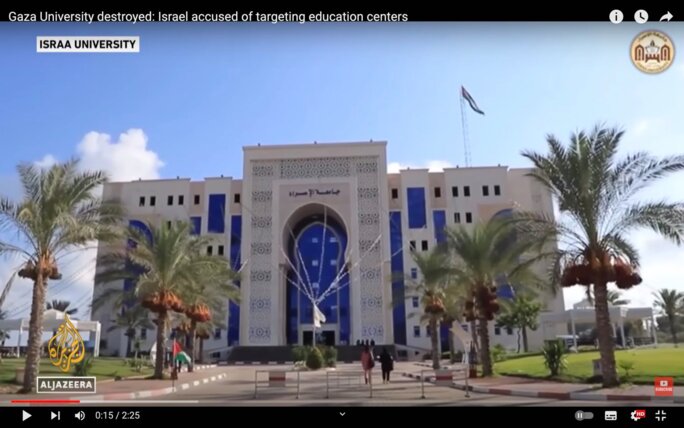
Agrandissement : Illustration 10

Please disseminate this appeal (possibly on other social networks) and relay it mainly to university and higher education teachers... but why not also to teachers in the final year of high school.



